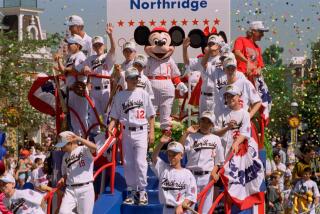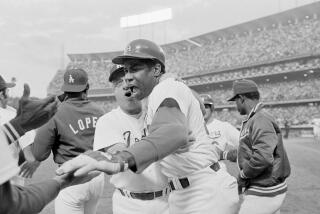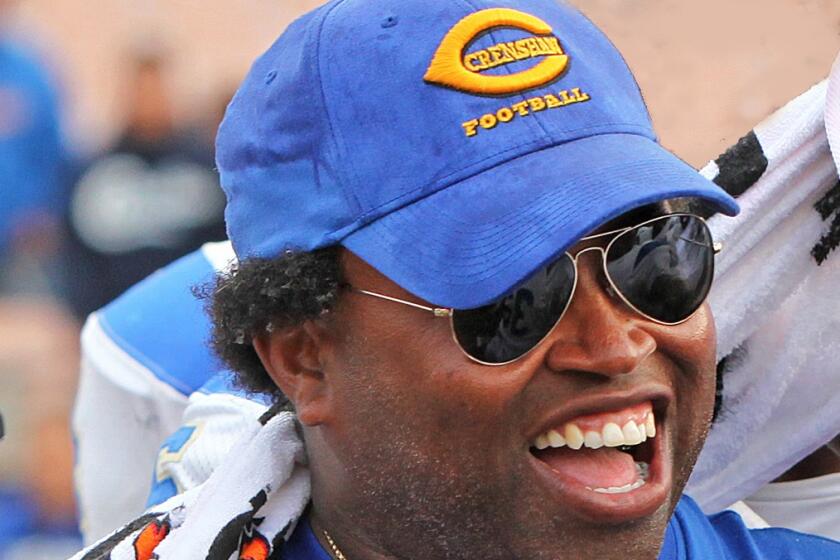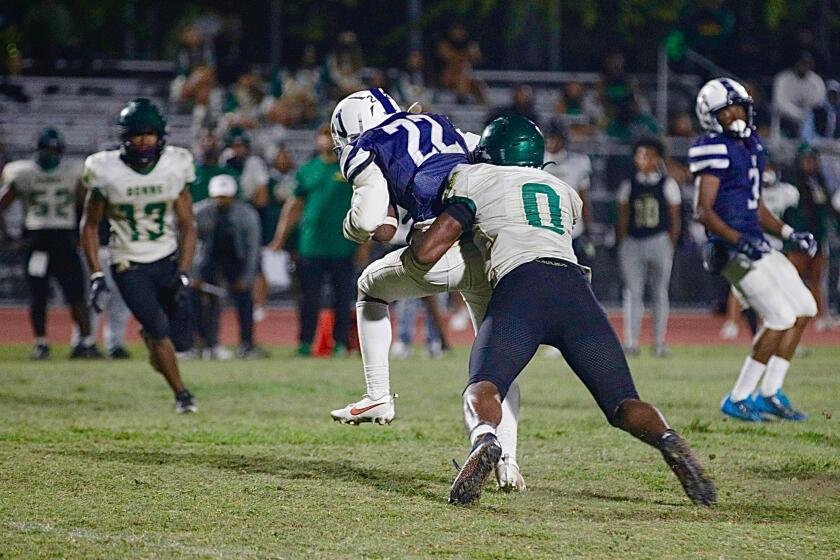In Cincinnati, He No Longer Sees Red : Dave Parker Left His Fuming Anger, Not His Great Talent, Behind Him When He Moved Out of Pittsburgh
One day the colorful, color-coordinated Pirate baseball team rolled into town, wearing those black and yellow uniforms of theirs, which obviously had been purchased from Frederickâs of Pittsburgh. It was a hot morning in Chicago and the Pirates were a little hot, too, under their ugly collars. They were playing good baseball, but getting bad vibes.
For some reason, the Pirates sensed that they were unloved. After all that âWe Are Fam-i-leeâ gospel of the previous season, when they had won the World Series, the Pirates were still dragging behind the rest of the league in attendance, were still being portrayed by the press as rowdies, and worst of all were still being ignored by too many Pennsylvanians, who came to most of the teamâs games at Three Rivers Stadium disguised as empty chairs. The running joke in Pittsburgh was that there were about 100 baseball fans per river.
Feeling most ignored was Dave Parker, the only man in the ballpark large enough to be playing for the more popular team in town, the Steelers. Here was a guy who had annexed back-to-back batting titles in 1977 and â78, had been elected the National Leagueâs MVP and had carried the Pirates, along with the popular Willie Stargell, to the come-from-behind conquest of the Baltimore Orioles in the â79 World Series. All he had done that season was hit .310, with 25 home runs and 94 RBIs.
As Parker recalls six years later, âFor the money I was making, some people didnât think that was enough.â They expected .330, 35 homers and 124 RBIs, he guesses. Before the season, Parker, promising big numbers on the field and demanding the same off the field, had signed a new contract for a million bucks a year, the first major leaguer ever to hit seven figures. With the steel and coal industries suffering, with the mills and mines shutting down, millionaires were often looked upon not as pillars of the community, but as pillars of greed. Parker says he began to see himself portrayed as a black man with a big ego who was vain.
The fans revolted. They yelled and cursed at Parker, literally behind his back. At a very large target in right field, they began to throw things. Pitcher Kent Tekulve told The Sporting News: âThey threw nuts and bolts and bullets and batteries at him. On Bat Day, I saw a father take his kidâs bat away and throw it at Parker. He tried to hurt him, and he cost his kid a bat. Those fans thought they were seeing a giant man who didnât care about anybody but Dave Parker. They were dead wrong.â
A typo in a Houston baseball writerâs story once accused Pittsburgh fans of hurling automobile batteries at Parker. Were this true, these fans must have been built like Arnold Schwarzenegger. Yet things were nearly that bad. âNothing in the baseball world could be as bad than what I went through in Pittsburgh,â Parker said at the All-Star Game last week in Minneapolis.
Now that he had come to the Cincinnati Reds, was playing in his home town and was whacking baseballs all over the park, Parker was feeling mellow. He was anything but that on that warm 1980 morning in Chicago, however. By the time he reached the Wrigley Field clubhouse, as a matter of fact, Parker was a 6-foot-5, 230-pound locomotive, moving at full speed and steaming.
The day before, a local writer had wandered over to Bill Madlock, a wonderful hitter and a wonderful talker. A fun guy. The Pirate infielder was one of the guys whose outgoing behavior had helped the club become known as, well, colorful. The Pirates were loud, proud and rowdy. Even as late as 1982, that reputation was intact. When a bus pulled up to Milwaukeeâs County Stadium during the 1982 World Series, musical instruments were playing and passengers were hanging out of the windows, jiving with passing strangers. âMust be the Pirates,â a baseball writer said.
Anyway, a guy asked Madlock whether it was true or not that the Pirates were a rowdy bunch of guys. âOh, definitely,â Madlock said. âYou never know what these guys are going to do next. Somebodyâs always giving it to somebody else. Sometimes thereâs so much shoutinâ going on, you canât hear yourself think.â
Madlock also got more specific, discussing, among other things, the temperament of his good buddy Parker. These quotes were later attributed anonymously, because Madlock was worried about hurting his friendâs feelings.
He had reason to worry. Next morning, Parker came roaring into the clubhouse. The article had described the Pirates as âNational Leagueâs Animal Clubhouseâ and had needled them about their behavior, their reputation and their kaleidoscopic, mix-and-match, black-and yellow wardrobe. Catcher Ed Ott, having been described as looking like John Belushi dressed as a killer bee, came to the park searching for the author of these words, carrying a handmade gift. He had taped two cardboard toilet-paper rolls together, colored them black and yellow with felt-tip markers, and twisted one end into a stinger. He knew just where he wanted to put it.
Parker had taken the article as an insult. But he wanted to sting not the writerâs hide, but the anonymously quoted teammate. âWho said this (bleep)?â Parker shouted, waving the newspaper. âBe a man. Step forward and say it to my face.â A chair, placed inconveniently in front of him, went flying.
Madlock, facing his locker, grinning merrily, mumbled beyond Parkerâs earshot: âYeah. Step forward. Who said that stuff?â
Parker was on fire those days, and his teammates knew it. He was volcanic. Between the pressure of performing under that big-bucks contract and the abuse being heaped and hurled upon him by the fans, his usual good humor had abandoned him. Any neutral party became an enemy and any comment became an insult. Madlock knew that as well as anyone. âSaying Dave Parker had a temper wasnât anything he hadnât heard before,â Madlock would later say. âBut, in the mood he was in, you had to be careful about anything you said about him. Nobody in his right mind would want to get that man angry.â
Pittsburghâs fans got the job done. They virtually ran him out of town. Long before the 1983 season was over, Parker knew he could take no more. As soon as his contract was up, he sifted through the offers and decided to sign with Cincinnati. It pleased him not only that he could return to the town where he once worked as a Crosley Field vendor, but that the Reds, baseballâs most reluctant signers of free agents, were willing to fork over good money and take a chance.
Parker did not let them down. Last season, at 33, he hit .285 with 16 homers. He did not make the NL All-Stars--he spent the three-day midsummer break in Bradenton, Fla., where the Pirates train in the spring, and went to the dog track every night--but âat least I proved I was a valuable commodity again.â He played better, looked better--different at least, the Reds having forced him to shave off his beard--and felt better, having escaped the horrors of Pittsburgh.
âI am still a bona fide baseball player,â Parker said last week. âAnd, itâs a slap in the face for all those baseball individuals who said I was through.â
He made the All-Stars this time because he is having a great season. As of Sunday, Parker was fifth in the league in hitting (.299), tied for third in RBIs (65), fourth in homers (17), fourth in hits (105), tied for third in doubles (21) and was earning every penny of a renegotiated contract. He had signed with Cincinnati for $800,000, taking a cut from his halcyon Pittsburgh days, but received a contract extension from the Reds for two more years at $1 million a crack.
âA lot of teams didnât want me,â Parker said. âThey said I was washed up. But the best athletes donât need advice. You donât tell him heâs through. You tell yourself youâre through.â
Parker feels he has four or five more years to give to the game, to be close to his Cincinnati loved ones and to âbe around people who know me as an individual.â Cincinnati fans, he contends, understand that he is doing his best, and that when he strikes out or makes an error, he needs encouragement, not harassment. âThe people in Cincinnati have been lovely,â Parker said. âOf course, anything would be better than what I was going through in Pittsburgh.
âI needed to get out of the situation I was in, not only because of the fans, but because the team was going in the wrong direction. The proof of that is that Pittsburgh finished in last place last season and is well on its way to finishing in last place this season. Iâve got a lot of personal friends over there, but the Pittsburgh club used to be special. Itâs not anymore. Thereâs an empty feeling in my heart for them.â
Parker still believes there was some racial prejudice behind what happened to him in Pittsburgh. Not that the people there are anti-black--their affection for Stargell alone is rebuttal to that--but Parker contends that a black man still has trouble being flamboyant and outspoken and brashly confident. Pete Rose could get away with it, but not Dave Parker, he is convinced. Stargell was sweet and publicly humble. Parker was boastful, but considered himself eager, not evil.
Cincinnati fans have come to accept Parker for what he is, which is colorful. Of course, he does not go around predicting batting titles any more, nor taunting opponents. He is not the same Dave Parker he used to be, except for the fact that with some people, he still cannot win. In his column in The Sporting News, Bill Conlin, who covers the National League, said he considers Parker not so much an MVP candidate as a comeback-of-the-year candidate, because: âHeâs having the kind of season the Pirates thought they would be getting when they laid that $1 million a year contract on him in 1979. Heâs having a normal Dave Parker season, not an MVP season.â
Parker wonât come storming into the clubhouse, waving the paper and yelling: âWho said this (bleep)?â
But he could.
âI needed to get out of the situation I was in, not only because of the fans, but because the team was going in the wrong direction. The proof of that is that Pittsburgh finished in last place last season and is well on its way to finishing in last place this season. Iâve got a lot of personal friends over there, but the Pittsburgh club used to be special. Itâs not anymore. Thereâs an empty feeling in my heart for them.â
--DAVE PARKER
More to Read
Go beyond the scoreboard
Get the latest on L.A.'s teams in the daily Sports Report newsletter.
You may occasionally receive promotional content from the Los Angeles Times.










